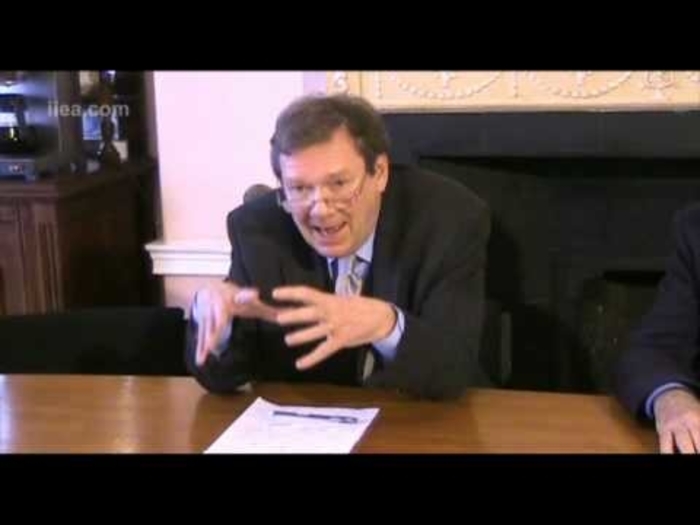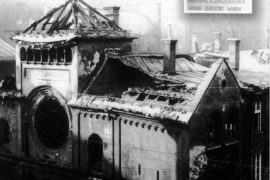We’ve posted previously about the full-throated support for the Palestinian cause consistently expressed by the Financial Times international editor, and former Mid-East editor, David Gardner. But, his latest column takes his anti-Israel advocacy a step further.
Before we get to Gardner’s framing of Palestinian violence, let’s first briefly address the egregious distortions in his op-ed (“Palestinian unity upends Middle East status quo”, May 26):
Longer term, a rightwing-dominated Israeli political elite that assumed it had domesticated Palestinians by colonising their land is confronted with an uprising across Greater Israel…
As we’ve noted previously, only a very small percentage of West Bank land, prior to the Six Day War, was privately owned Palestinian land. Most was state land. So, it’s entirely inaccurate to suggest that all of the contested territory in Judea and Samaria – occupied by Jordan before the war – is “their land”.
Here’s another ahistorical claim:
Having rejected a two-state solution — an independent Palestine alongside Israel — Israel’s politicians face having to manage a de facto single state.
Gardner is being dishonest by eliding the Palestinians’ rejection of several Israeli peace offers over the last twenty years.
The op-ed continues:
This has roughly equal Arab and Jewish populations, but with such disparity of rights it is described by critics as an apartheid state.
See CAMERA’s take-down of HRW’s apartheid lie here.
Then, Gardner introduces language which, as we’ll show, arguably frames Palestinian and Arab-Israeli violence over the last few weeks as something positive:
Israel has never been held accountable for settling the West Bank and Arab East Jerusalem after it conquered them in the 1967 six-day war. This month’s rebellion may change that.
Israel is now fighting a Palestinian revolt on three fronts: against Hamas, which controls Gaza and fired over 4,000 rockets at Israeli cities and towns during the recent conflict; against Palestinians with Israeli nationality, now in vicious communal strife with their Jewish neighbours; and against Palestinians across the occupied West Bank and East Jerusalem.
So, to Gardner, the decision by Hamas, the Iranian-backed terror group ideologically committed to the mass murder of Jews – a group he dishonestly dismisses as “a rag-tag army firing outsized pipe bombs” – to launch rockets at Israeli civilians, from territory Israel withdrew from 16 years ago, is a “revolt” or “rebellion”.
Not only that, but the Palestinian “revolt”, for Gardner, includes vicious attacks on Jews by Arab citizens of Israel. Violence during that period also included Jewish attacks on Arabs, but his focus is on the former, which, let’s recall, included stoning Jews to death and the firebombing of Jewish homes and synagogues – violence which, at its worst, was more akin to a pogrom than an ‘uprising’.
Further, Gardner’s “revolt” includes the initial unprovoked violent rioting at the Temple Mount/Al-Aqsa Mosque incited by Palestinian leaders. This is important, because Gardner later makes the following claim:
Provocations in the city and its holy sites by Netanyahu’s extremist allies sparked the latest eruption.
The “provocations” he’s referring to includes the legal case involving Sheikh Jarrah, a private property dispute in which the Israeli government is not a party to.
Plus, let’s remember that the government, during the early days leading up to the war, took several steps to calm the tension: forcing, on May 7th, far-right MK Itamar Ben Gvir to vacate Sheikh Jarrah; Asking the Supreme Court, on May 9th, to postpone their ruling on the Sheikh Jarrah case; closing the Temple Mount to Jews on May 10th; and, on that same day, re-routing the Jerusalem Day March so that it wouldn’t pass the Muslim Quarter of the Old City.
Gardner’s pro-revolt framing continues:
The Palestinians have now coalesced on three fronts, as well as in the diaspora. The May 18 general strike of Palestinians in Israel, the West Bank and Arab East Jerusalem and, to a degree, in a Gaza devastated by Israeli bombardment, was a significant moment. Some observers say nothing like it has been seen since before the birth of Israel and the 1936 Arab Revolt.
The Arab Revolt of 1936, of course, may include the word “revolt”, but it can more aptly be described as as an organised three year campaign of antisemitic violence by Arabs. Led by the pro-Nazi Grand Mufti Haj Amin al-Husseini, the attacks on Jews (and British soldiers) was accompanied by a general Arab strike to put a stop to Jewish immigration and the sale of property to Jews.
As CAMERA has noted, the Arabs’ three-year campaign of violence, which resulted in scores of Jews killed or maimed, was finally suppressed in 1939, after which a British White Paper limited Jewish immigration into Palestine. As a result, many of the Jews fleeing Nazi Germany were denied a haven from destruction.
Is Gardner suggesting that that Arabs’ actions during this time – and the political impact – was somehow justifiable, or even admirable?
Finally, in the penultimate sentence of the op-ed, Gardner proclaims that it’s “astonishing that a diverse Palestinian people has emerged resiliently in the vanguard of this shift [in strategy]”.
In his framing of both the events in the 1930s, and the recent violence, it seems as if the international editor of the globally influential paper has taken his loathing of Israel to such a degree that he’s arguably become a cheerleader for Palestinian violence.
Related Posts
- Guardian removes photo with “Zionism is Genocide” charge (CAMERA UK)
- Sheikh Jarrah: The Facts (CAMERA)






I wonder if he gets equally excited when Islamists kill Arabs and Afghan schoolgirls, or is it just violence against Jews that he enjoys?
Cancelled my FT subscription and won’t be back